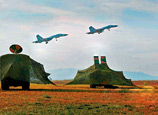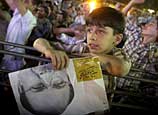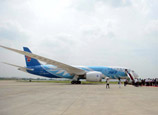
TEHRAN, June 8 (Xinhua) -- Iran has held three rounds of debates where presidential candidates surfaced issues which could have been less likely to be openly discussed in Iran's sociopolitical atmosphere otherwise.
Over the past week, eight Iranian presidential candidates took part in the debates and focused on the topics of economy, culture and politics.
In their third and final televised live debate on Friday, they were divided over the country's tactics in the nuclear talks with the world powers.
Former Iranian foreign minister Ali-Akbar Velayati, a conservative candidate, criticized the diplomacy over the country' s nuclear issue in the past years, saying it is "flawed."
"This is not diplomacy to sit face-to-face with the other side and to recite the same words" or "this is not diplomacy to read a statement for other countries," said Velayati, pointing to Iranian chief nuclear negotiator Saeed Jalili's style of negotiations with the world powers.
He argued that the Islamic republic and the world powers could have reached an agreement if the Iranian negotiating team has responded positively to the proposals of the P5+1 group (five permanent members of the UN Security Council plus Germany) in the last round of nuclear talks in Almaty of Kazakhstan.
"The art of diplomacy is to preserve the country's nuclear rights and, at the same time, we diminish sanctions," he noted.
To Velayati's expression of disapproval, Jalili, a hardline conservative candidate, responded by saying that it is not true, " in the talks we only expressed our positions."
Jalili said his negotiating team had been in effective dialogues with the P5+1 group, arguing that "the reason is since 2008 when the talks with them started, they have only issued one resolution and have not reached a consensus" over further sanction pressures on Iran.
Also, Hassan Rouhani, a moderate candidate, asserted that the incumbent "government has not acted successfully" as far as the nuclear issue is concerned.
Rouhani said that as the former chief nuclear negotiator, he was able to head off threats of attacks against his country and to prevent Iran's nuclear dossier from being sent to the UN Security Council through "wisdom" and rational nuclear policy.
Rouhani alluded to a voluntary and temporary suspension of its uranium enrichment program and the voluntary implementation of the Additional Protocol in 2004, after pressure from Britain, France and Germany (E3) that were acting on behalf of the European Union.
Iran acted weak in nuclear talks with the (E3) at that time, the West did not keep up with its promises and they further added to their demands, said Jalili.
As for international relations, the interests of the country will regulate the foreign policy of the Islamic republic, said Jalili, emphasizing that "If our interests are at odds with the demands of some countries, we should defend our rights" by resistance.
Velayati replied that if he is elected as president in the June 14 election, he will establish a "constructive interaction with the states of the world" which will help his country tackle a number of domestic and international problems.
Meanwhile, Rouhani said that interaction with the world countries comprises the main part of his foreign policy.
In the second round of debate on June 5, the mediator drew on limited, but significant, cultural and social topics and sought the candidates' viewpoints.
Traditionally, the Iranian conservatives, or rather as they call themselves as principlists, stuck to the Islamic-Iranian values and argued that in order for the values to be materialized in the country, government's control over a number of issues would be necessary.
Jalili said that three institutions of family, mosques and schools are the potentials in the Iranian culture which can be supported by the government so that "social maladies could be contained."
Conservatives' rivals, however, voiced for less interference of government in the social and cultural affairs.
About the social liberties, pro-reformist candidate Mohammad- Reza Aref criticized the Iranian conservatives' policies in creating "security atmosphere in universities" and imposing bans on dissident media, saying that "confrontation, restriction and elimination will not be a solution" to the cultural demands "in the age of communication."
Opposing to the view of Jalili, who envisaged "motherhood" as the best job for women to raise decent children, moderate Rouhani said that women in his administration will "enjoy equal rights" as men and "will enjoy special insurance."
He will establish a "ministry of women affairs" to help them achieve their rights, in case he wins people's vote, said Rouhani, adding that if governments should reduce their interference in cultural issues, some cultural institutions will grow and will be instrumental in alleviating the country's cultural problems.
Tehran's Mayor Mohammad-Bagher Qalibaf and Velayati took the middle position on cultural discussions, saying that next government should stick to the values of the Islamic republic but can allow people to run cultural affairs.
In the debate with the topic of economy on May 31, the candidates almost unanimously criticized the government's economic policies and drew upon the economic problems facing the country, with inflation and unemployment as the focus.
Aref said "The root cause of the country's economic problems is the dominance of a single political current, namely the principlist movement, over the country's affairs."
"Another cause is the participation of certain military forces and companies affiliated with military institutions in economic affairs, which has greatly restricted the participation of the private sector, and privatization has not been fully implemented," said Aref.
Aref, former first vice president under reformist president Mohammad Khatami (2001-2005), associated the economic situation of the country with the Islamic republic's foreign policy, saying that "another problem is our relations with other countries. We could use the privilege of good relations with the world to resolve the economic problems" but it has not happened.
Aref's remarks were echoed by Velayati, who also called for improving ties with the world as means to solve the economic concerns overwhelming the country.
Iran is under substantive economic sanctions by the UN Security Council and Western countries, which have partially been the cause of decline of the country's economic growth, depreciation of currency value and high rampant inflation.
Meanwhile, Qalibaf said economic plans should not be changed on a weekly or monthly basis, implicitly criticizing the administration of President Mahmoud Ahmadinejad.
According to Iran's Interior Ministry, nearly 50.5 million eligible voters will cast ballots in the election contended by eight candidates -- most of whom are conservatives.
















 Sick girl realizes dream on the stage
Sick girl realizes dream on the stage


![]()
